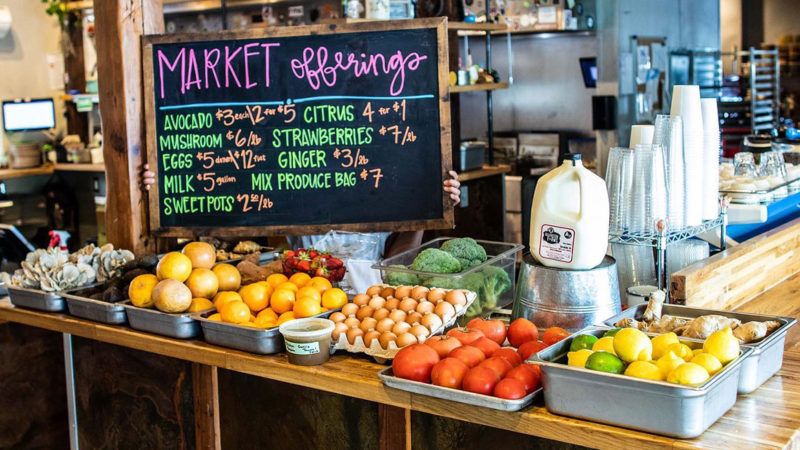Governments Are Cutting Red Tape To Keep Americans Fed
Regulators ought to take a scalpel to the many burdensome rules still on the books.

As federal, state, and local governments respond to the COVID-19 pandemic, some are loosening rules to ensure consumers can get adequate sustenance.
Last month, the U.S. Department of Agriculture and the Food and Drug Administration (FDA) temporarily relaxed food-labeling rules to allow some companies to sell things that are not labeled for individual sale. That includes foods such as those that had been labeled for sale to a restaurant, hotel, or university food service provider, which typically don't contain the Nutrition Facts labels that are required to appear on items sold directly to consumers. That has given states and cities leeway to allow the restaurants they regulate to sell groceries that don't comply with some current FDA labeling rules. Many states have also relaxed liquor laws during the pandemic by allowing restaurants to offer to-go alcohol with takeout food.
In March, the Trump administration suspended enforcement of rules that set the maximum hours that truck drivers who are delivering key supplies, including food, may work without a break. While that's a smart approach given the supply-chain issues the food system is experiencing, it came as many restaurants—including those at highway rest stops—were limiting hours or closing. And many restaurants that have remained open now offer drive-thru service only, which can prevent semitruck drivers from accessing them. In April, California's state transportation department, Caltrans, decided to allow food trucks that obtain a free permit to park at rest stops in the state and sell food to truck drivers and others there. Some California counties, it turns out, have no rest stops—but at least regulators appear to be trying.
Cutting red tape temporarily during a nationwide emergency is prudent. But easing the regulatory burden on food businesses doesn't make sense only during a crisis. Will Californians be harmed if the state continues to allow food trucks to serve truckers? Nope. Will people be harmed if restaurants can sell groceries or fill to-go alcohol orders? Probably not.
Rolling back regulations supports both short-term goals (making sure people have sufficient access to food) and long-term ones (facilitating commerce and allowing the economy to recover). Making many of these relaxed rules permanent is a start, but taking a scalpel to the many, many burdensome rules still on the books must be the next step.
Editor's Note: As of February 29, 2024, commenting privileges on reason.com posts are limited to Reason Plus subscribers. Past commenters are grandfathered in for a temporary period. Subscribe here to preserve your ability to comment. Your Reason Plus subscription also gives you an ad-free version of reason.com, along with full access to the digital edition and archives of Reason magazine. We request that comments be civil and on-topic. We do not moderate or assume any responsibility for comments, which are owned by the readers who post them. Comments do not represent the views of reason.com or Reason Foundation. We reserve the right to delete any comment and ban commenters for any reason at any time. Comments may only be edited within 5 minutes of posting. Report abuses.
Please to post comments


The alcohol on delivery will take a couple years to roll back, but the food trucks I imagine will be back to being regulated the second people are out and about again. Purely because the first is effecting people stuck at home, while the latter only is benefiting people who are working outside the home. Who are by and large poor and people Californian's aren't known for caring about the opinions of.
My Boy pal makes $seventy five/hour on net. he has been job less for six months. However he earns$16453 genuinely working at the internet for some hours.
Immediately join from the source….....► Home Profit System
The best way to keep Americans fed is to implement Charles Koch's vision — unlimited, unrestricted immigration of highly skilled workers from Mexico.
#OpenBordersWillFixEverything
#ImmigrationAboveAll
Yes, Americans need unlimited taco trucks that offer cheap food of questionable origin.
Sofia Richeredson have been working from home for 4 years now and I love it. I don't have a boss standing over my shoulder and I make my own hours. The tips below are very informative and anyone currently working from home or planning to in the future could use these.Make 5000 bucks every month... Start doing online computer-based work through our website... Reading Articles
#SoylentGreenForMe
#SoylentBrownForThee
The people will get a taste for this freedom and want it permanently. Luckily for bureaucrats, the people don't have a say in the matter.
Taking a scalpel to food regulations? Surely you mean a meat cleaver.
Do truckers that starve to death because they can't get fast food count as Communist Chinese Virus deaths?
Yes people can change and adapt when the rules don't box them in. We The People can figure it out for ourselves.
Round here they had just banned plastic grocery bags when this nonsense happened. Currently all stores are using plastic and it's unlawful to bring your reusable bags into the store. That, folks, is comedy.
There are no regulations anymore, as long as you say you're doing it to protest systemic racism
Take a scaple to the regulation., or a blow torch?
Dang Jerry's kids beat me to kt
Whether a meat cleaver, a blow torch or a bolt gun; but a scalpel is not the right metaphor since A) scalpels are precise instruments doing precise trimming and we need huge chunks of regulations lopped off and B) scalpels are generally connected with human surgery, we're talking about food and humans are generally not considered food. Yet.
#SoylentBrown as noted above
I prefer the humble spork.
I thought pork was forbidden to your kind.
"Regulators ought to take a scalpel to the many burdensome rules still on the books."
Rather, a double- bitted felling axe!
Nuke the rules from orbit, it's the only way to be sure.